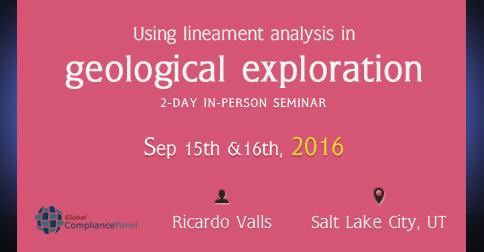We reach more than 65,000 registered users in Dec!! Register Now

Using Lineament Analysis in Geological Exploration Seminar
- September 26, 2016
- 3110 Views
- 1 Likes
- 0 Comment
Overview: Upon completing this course participants should: Understand the limitations of the current exploration process Learn to use lineament and satellite interpretation as a way to define where to concentrate their exploration efforts How to implement QA&QC procedures to guarantee the quality of the collected data Why should you attend? We will introduce you to an effective and affordable methodology that identifies prospective targets which are relat..
Overview:
Upon completing this course participants should:
- Understand the limitations of the current exploration process
- Learn to use lineament and satellite interpretation as a way to define where to concentrate their exploration efforts
- How to implement QA&QC procedures to guarantee the quality of the collected data
Why should you attend?
We will introduce you to an effective and affordable methodology that identifies prospective targets which are related to, or controlled by tectonic structures. Even over new areas with limited or nonexistent geological information we are able to help you concentrate your exploration efforts to keep your budget in the black.
Appropriate sampling and Quality Assurance/Quality Control (QA/QC) procedures are essential in all aspects of the mineral deposit evaluation process to ensure the best possible confidence in resultant mineral resource and reserve estimates are achieved; the quality of an estimate is dependent on the quality of the data used.
The Quality Assurance and Quality Control (QA/QC) procedures and protocols are designed to ensure that data collected and created by the Company is of a high level of quality and is in compliance with CIM Standards and Guidelines. In practical terms, geological quality control procedures are intended to monitor precision and accuracy of the assay data, as well as possible sample contamination during sample preparation and assaying.
Compliance with the Industry established QA/QC are no longer an option, but a necessity for all the companies to implement, especially those that trades in the markets.
We have implemented a quality assurance program for the field sampling procedures which include collection, labeling, and shipping components. Quality assurance is essentially the management system that operates to ensure credible results. Our quality control component of this system is a set of activities intended to control the quality of the data from collection through to analysis. It consists of day-to-day activities such as: the adherence to written protocols; up-to-date and suitable training of personnel; the use of reliable laboratories with excellent QA&QC systems in place, the regular use of quality control (QC) samples (blanks, standard samples, and field duplicates); and, diligent record keeping. The prime objective of the field QA program is to maximize accuracy by reducing introduced variability.
If you want to find your next ore body in the most effective way then this webinar is for you.
Areas Covered in the Session:
- History of the problem, why we need to change the current approach.
- Lineament analysis
- Lineament analysis and satellite interpretation of data
- Physical modeling (3D strain analysis and 3D stress analysis).
- Statistical procedures (Compositional data analysis, correlation analysis, principal component and other methods).
- Defining a QA/QC program, Blanks, duplicates, standards, external controls.
- Procedures and audits
- Rock naming in the field
- Conclusions and recommendations.
Who will benefit:
This course is designed for people tasked with developing, maintaining and/or improving environmental monitoring programs for non-sterile manufacturing facilities. This includes individuals that have Quality Management Systems responsibilities for making general improvements in their organization’s performance specifically related to microbial control of the manufacturing environment. Following personnel will benefit from the course:
- Senior geologists
- Geochemists
- Exploration personnel
- Laboratory personnel
- Managers
- Graduate students
- Postgraduate students
- QA&QC personal
Agenda:
Day 1 Schedule
Lecture 1: History of the problem, why we need to change the current approach.
Lecture 2: Lineament analysis
Lecture 3: Lineament analysis and satellite interpretation of data
Lecture 4: Physical modeling (3D strain analysis and 3D stress analysis).
Lecture 5: Statistical procedures (Compositional data analysis, correlation analysis, principal component and other methods).
Day 2 Schedule
Lecture 1: Defining a QA/QC program, Blanks, duplicates, standards, external controls.
- How to use them
- How to interpret them
Lecture 2: Procedures and audits
- Laboratories
- Drilling
Lecture 3: Rock naming in the field.
Lecture 4: General recommendations, Conclusions and recommendations.
Lecture 5: Questions and answers
Speaker:
Ricardo Valls
President, Valls Geoconsultant
As a professional geologist with thirty years in the mining industry, I have extensive geological, geochemical, and mining experience, managerial skills, and a solid background in research techniques, and training of technical personnel. I am fluent in English, French, Spanish, and Russian. I have been involved in various projects world-wide (Canada, Africa, Russia, Indonesia, the Caribbean and Central and South America). Projects included from regional reconnaissance to local mapping, diamond drilling and RC-drilling programs, open pit and underground mapping and sampling, geochemical sampling and interpretation, and several exploration techniques pertaining to the search for diamonds, PGM, gold, nickel, silver, base metals, industrial minerals, oil & gas, and other magmatic, hydrothermal, porphyritic, VMS and SEDEX ore deposits. Special strengths are related to acquisition of new properties, geochemical and geological studies, management and organization, geomathematical analysis and modelling, compositional data analysis, structural studies, database design, QA&QC studies, exploration studies and writing technical reports. P.Geo. registered in the provinces of Ontario and Quebec.
Location: Salt Lake City, UT Date: September 15th & 16th, 2016 and Time: 9:00 AM to 4:30 PM
Venue: Hilton Garden Inn Salt Lake City Airport
Address: 4975 Wiley Post Way, Salt Lake City, Utah, 84116, USA
Price:
Register now and save $200. (Early Bird)
Price: $895.00 (Seminar Fee for one Delegate)
Until July 31, Early Bird Price: $895.00 from August 1 to September 13, Regular Price: $1,095.00
Quick Contact:
NetZealous DBA GlobalCompliancePanel
Phone: 1-800-447-9407
Fax: 302-288-6884
Email: support@globalcompliancepanel.com
Website: http://www.globalcompliancepanel.com
Registration Link - http://bit.ly/29fKM3M-geological-exploration
Follow on LinkedIn: https://www.linkedin.com/company/globalcompliancepanel









